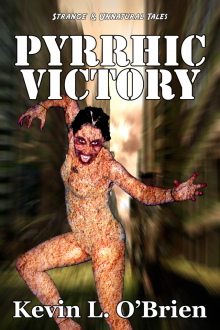


Pyrrhic Victory
Kevin L. O'Brien

Pyrrhic Victory
Kevin L. O'Brien
+++
Text Copyright 2013 by Kevin L. O'Brien
Cover design and typography copyright 2014 by Kevin L. O'Brien
Stencil Standard font distributed under a free use license
+++
License Notes
Please consider writing a review for this book on the retailer's website.
If you see any misspellings or typographical errors, please notify Kevin L. O'Brien using one of his online social networks. Thank you.
+++
This is a work fiction. Names, characters, places, and incidents, including those based on the real world, are either products of the imagination of Kevin L. O'Brien or used fictitiously. Any resemblance to actual events, locales, or persons, living or dead, is entirely coincidental.
Because some ebook platforms do not support special characters, certain words may appear misspelled, but this was done deliberately to avoid the problem of the platforms deleting the characters. Also, the LRF platform used by older models of the Sony Reader does not permit the use of links to external URLs, whereas the PDB platform used by Palm reading devices does not support any form of linking whatsoever.
+++
Table of Contents
Preface
Pyrrhic Victory
About the Author
Other Books by Kevin L. O'Brien
Connect with Kevin L. O'Brien
Sample Excerpts
+++
Preface
I am not an aficionado of Zombie Apocalypse fiction. I've seen some movies (I particularly like the Resident Evil films), read a few stories, and I have a well-thumbed copy of Max Brooks's The Zombie Survival Guide, but beyond that I am strictly a dilettante. Even so, what strikes me as odd about this genre (and I think it has grown large enough to be considered a genre of its own) is that I have never encountered a story or movie where we humans were able to find a way to eradicate the Zombie plague (though I believe both the novel and movie versions of World War Z finally break that convention). At best, a few survivors find some kind of sanctuary, or what's left of Humanity learns to cope with the Zombie horde. While I can accept that one of the defining characteristics of this genre is a fatalistic nihilism, I don't see that it is necessary that every story end with Mankind becoming an endangered species, if not virtually exterminated.
In this story, Humanity tries to avoid that fate by seeking an alliance with another race of beings that has shared our world for millennia. (In fact, this is such a natural crossover between Zombie fiction and the Cthulhu Mythos that I'm surprised no one has thought of it before.) The problem is, they made the mistake of thinking that the enemy of their enemy is their friend, and that rarely proves to be true.
By the way, the title refers to the allegorical term for any win that is tantamount to a loss, because it ruins the victor. It is named after Pyrrhus, king of the Greek state of Epirus, who defeated Rome in two major battles in southern Italy in the early third century B.C., but suffered such heavy losses that he could not sustain his victory and eventually lost the war. The irony is that Rome suffered even greater casualties, but it had access to large numbers of reinforcements, whereas Pyrrhus did not.
Back to TOC
+++














